"Because of the multitude of teachers out there, I can be more picky about whom I teach. I will be teaching only those with great hearts - warrior hearts. And I hope that you all, when you return to your homelands, will teach only those with good hearts. That is my wish and that is why I do not make some giant organization."
- Masaaki Hatsumi
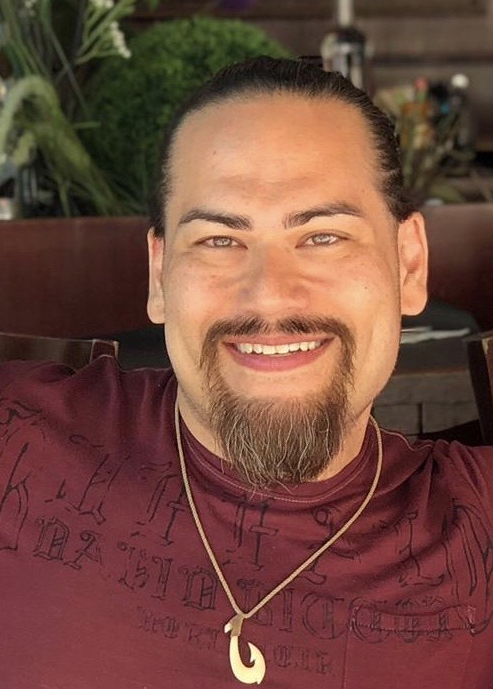
Shidôshi Joshua Noro Polier
士道師 ジョシュア 野呂 ポリア
Joshua Noro Polier is our main instructor. A native New Yorker, he has been an active student in the martial arts since he began training in Kodokan Judo at the age of four. Joshua has been training in the Bujinkan since 1991.
Joshua's experience of studying all over the world, under many instructors, has influenced and complimented his understanding of the Bujinkan art. His quest for the best instruction available has brought him all over North America, Europe and Asia.
Joshua's first trip to Japan for Ninjutsu instruction was in 1992 for several months. More recently, Joshua travels to Japan for training about twice a year. Joshua received his Shidôshi Menkyo (teaching license) from Hatsumi Soke in 2000. In January of 2006, after 15 years of searching, Joshua finally found who he was looking for, his future teacher, Dr. Kacem Zoughari.
Outside of the dojo, Joshua strives for balance by pursuing the healing arts; Joshua is a practicing NY State Licensed Massage Therapist and a student of wellness, health and spirituality.
Shidôshi Ignacio Cubillan
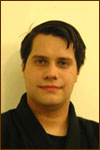 Ignacio started training in the Bujinkan in 1992, while in high school. Fortunately at this time, Sweden was one of the "capitals" of Bujinkan training in Europe. He has also trained in Venezuela and in the USA. He is trilingual, fluent in Swedish, Spanish and English. Ignacio moved to the US in 2000 and spent a fair amount of time investigating the various dojos in NYC before finding a good match, in the Benevolent Heart Dojo (BHD), for his continued training.
Ignacio started training in the Bujinkan in 1992, while in high school. Fortunately at this time, Sweden was one of the "capitals" of Bujinkan training in Europe. He has also trained in Venezuela and in the USA. He is trilingual, fluent in Swedish, Spanish and English. Ignacio moved to the US in 2000 and spent a fair amount of time investigating the various dojos in NYC before finding a good match, in the Benevolent Heart Dojo (BHD), for his continued training.
Assistant Instructor Cameron McNair
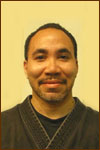 Cameron started his formal training in martial arts while attending Princeton University, studying for several years the Korean art of Tang Soo Do, Moo Duk Qwan, achieving the rank of black belt. Cameron joined the Bujinkan dojo in 1999 training under Greg Kyle, David Greenberg and his current instructor, Joshua Polier. Cameron attends Bujinkan seminars and Tai Kai whenever possible. Outside of his interest in all things Japanese, Cameron is employed as a senior director of budgets. He enjoys spending time with his wife and daughter, and playing music in his free time.
Cameron started his formal training in martial arts while attending Princeton University, studying for several years the Korean art of Tang Soo Do, Moo Duk Qwan, achieving the rank of black belt. Cameron joined the Bujinkan dojo in 1999 training under Greg Kyle, David Greenberg and his current instructor, Joshua Polier. Cameron attends Bujinkan seminars and Tai Kai whenever possible. Outside of his interest in all things Japanese, Cameron is employed as a senior director of budgets. He enjoys spending time with his wife and daughter, and playing music in his free time.
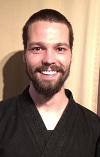 James, as a child in 1980 began training in Karate. Over the years
James has tried several arts, all the while looking for
something he still can't quite verbalize. From Taekwondo (ITF and WTF) to
Systema and a few arts in between he found useful things everywhere but James
didn't find the essence that he was looking for until he began
training with the BHD. James is happy to have found Josh, Ignacio, and
the other BHD members and he is
thankful to them as well as to their teachers for transmitting
the art so that it could reach him.
James, as a child in 1980 began training in Karate. Over the years
James has tried several arts, all the while looking for
something he still can't quite verbalize. From Taekwondo (ITF and WTF) to
Systema and a few arts in between he found useful things everywhere but James
didn't find the essence that he was looking for until he began
training with the BHD. James is happy to have found Josh, Ignacio, and
the other BHD members and he is
thankful to them as well as to their teachers for transmitting
the art so that it could reach him.
James is a musician and is employed in IT.
Before finding the Benevolent Heart Dojo, Nicole Brancato had no pervious martial arts experience. Nicole's brother, an officer of the United States Army and experienced martial arts practitioner, guided her towards Bujinkan Budo Taijutsu. So she spent the summer of 2014 searching for a Bujinkan dojo which emphasized quality of movement, precision and effectiveness. After the first class at the Benevolent Heart Dojo, she immediately felt at home; the dojo stood out among the others she had visited, and she knew she had found what she
looking for.
Nicole is a professional pianist, and she is constantly drawing connections between her studies in music and martial arts.
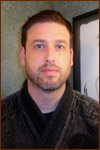 Donovan began his martial arts path in 1989 when his step-father started training in Aikido at Steven Segal's dojo in West Hollywood. During this time he started collecting and reading a number of Masaaki Hatsumi Sensei's books, but it wasn't until Donovan moved to Arizona that he also started training in Aikido. A few years later Donovan moved to NYC and decided to follow his original desire to train in Ninjutsu related arts and in 2003 was fortunate to be able to start training under shidôshi Joshua Noro Polier. After a break, Donovan returned in early 2009 and has been at it ever since. Donovan has been to Japan twice and hopes to return again. He lives with his wife Kim and their three kids Anthony, Ryan and Olivia.
Donovan began his martial arts path in 1989 when his step-father started training in Aikido at Steven Segal's dojo in West Hollywood. During this time he started collecting and reading a number of Masaaki Hatsumi Sensei's books, but it wasn't until Donovan moved to Arizona that he also started training in Aikido. A few years later Donovan moved to NYC and decided to follow his original desire to train in Ninjutsu related arts and in 2003 was fortunate to be able to start training under shidôshi Joshua Noro Polier. After a break, Donovan returned in early 2009 and has been at it ever since. Donovan has been to Japan twice and hopes to return again. He lives with his wife Kim and their three kids Anthony, Ryan and Olivia.
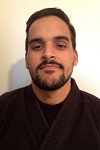 Ian's interest in martial arts began early on in life. He received formal training in Tae Kwon Do as a child. Later on he found a Gung Fu school that became a major part of his life. After a period of time, Ian began to search for a new path. Lucky for him, he found the Benevolent Heart Dojo following many months of research. Training under shidôshi Joshua Noro Polier and Ignacio Cubillan has been quite rewarding not only as a student of budo, but also as a student of life.
Ian's interest in martial arts began early on in life. He received formal training in Tae Kwon Do as a child. Later on he found a Gung Fu school that became a major part of his life. After a period of time, Ian began to search for a new path. Lucky for him, he found the Benevolent Heart Dojo following many months of research. Training under shidôshi Joshua Noro Polier and Ignacio Cubillan has been quite rewarding not only as a student of budo, but also as a student of life.
 Justin began training in Taekwon-Do in 1986 and continued on to receive his Instructor's certification and a 4th dan black belt in 2005. During this time Justin has had the honor to train closely with several highly skilled Masters of TKD including attending a seminar with the late General Choi Hong Hi (Founder of ITF TKD). While traveling and training, Justin began studying the basics of different martial arts and boxing styles with foreign Instructors and students who were also searching to improve their technique and understanding of what it means to be a martial artist. In 1999 Justin's journey led him to attend classes under Bujinkan instructor Ryan Reed who introduced him to a different perspective of combative movement. Justin then reexamined his approach to TKD and everything "Martial".
Justin began training in Taekwon-Do in 1986 and continued on to receive his Instructor's certification and a 4th dan black belt in 2005. During this time Justin has had the honor to train closely with several highly skilled Masters of TKD including attending a seminar with the late General Choi Hong Hi (Founder of ITF TKD). While traveling and training, Justin began studying the basics of different martial arts and boxing styles with foreign Instructors and students who were also searching to improve their technique and understanding of what it means to be a martial artist. In 1999 Justin's journey led him to attend classes under Bujinkan instructor Ryan Reed who introduced him to a different perspective of combative movement. Justin then reexamined his approach to TKD and everything "Martial".
Later, Justin relocated to New York City and continues his training in Budo Taijutsu at the Benevolent Heart Dojo under shidôshi Joshua Noro Polier. It is here that Justin has been granted the gift to train in Japan with his instructors and learn from Ishizuka Sensei and his master students. The Benevolent Heart Dojo has also provided Justin with the foundation to train law enforcement officers with field tactics under the senior leadership of Dr. Kacem Zoughari.
 Harold was first introduced to martial arts as a young child when he joined a Goju karate class at his local YMCA. In 2002, at the age of fourteen, he joined the local Bujinkan dojo and fell in love with the art. In 2007 he moved to Europe for college, where he was introduced to Kacem Zoughari and was deeply inspired by the quality of his taijutsu. In 2009 he spent six months in Japan, where he first met Hatsumi Soke and Ishizuka Sensei. As an assistant instructor of the Bujinkan Dojo Maastricht, he had the opportunity to volunteer as part of the security detail for His Holiness the Dalai Lama during three of his visits to Holland and Belgium.
Harold was first introduced to martial arts as a young child when he joined a Goju karate class at his local YMCA. In 2002, at the age of fourteen, he joined the local Bujinkan dojo and fell in love with the art. In 2007 he moved to Europe for college, where he was introduced to Kacem Zoughari and was deeply inspired by the quality of his taijutsu. In 2009 he spent six months in Japan, where he first met Hatsumi Soke and Ishizuka Sensei. As an assistant instructor of the Bujinkan Dojo Maastricht, he had the opportunity to volunteer as part of the security detail for His Holiness the Dalai Lama during three of his visits to Holland and Belgium.
Harold moved back to New York in late 2012, sought out the Benevolent Heart Dojo and has continued his training under Joshua ever since. Thanks to Joshua and the BHD, Harold has had the opportunity to participate in several dojo trips to train under the guidance of Kacem Zoughari and Ishizuka Sensei. He feels the quality of technical knowledge, instruction and mentorship provided by Joshua and Ignacio is truly beyond exceptional and is grateful to be a part of such an authentic and passionate dojo. Outside the dojo, Harold practices acupuncture and oriental medicine.
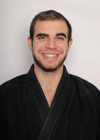 While in college, with no prior martial experience, Mike LoBello began practicing at the Benevolent Heart Dojo in 2010. Mike is very grateful to have started his training with Joshua and Ignacio. Both teachers have patiently helped guide Mike in his training and in his life. Mike has always been intrigued by martial arts, in particular the level of control and synergy one can develop with the body and mind. Outside of the dojo, Mike is a freelance videographer.
While in college, with no prior martial experience, Mike LoBello began practicing at the Benevolent Heart Dojo in 2010. Mike is very grateful to have started his training with Joshua and Ignacio. Both teachers have patiently helped guide Mike in his training and in his life. Mike has always been intrigued by martial arts, in particular the level of control and synergy one can develop with the body and mind. Outside of the dojo, Mike is a freelance videographer.
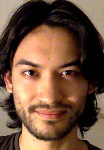 Matthew began his practice with Benevolent Heart Dojo in 2013. When he first arrived he felt in awe of the mountain he saw in front of him. Thanks to Josh's skilled guidance he began climbing. He enjoys the challenge of the art and the supportive atmosphere of the dojo. He feels grateful for he has learned from both his instructors and his peers. He has increased his tenacity and confidence through his practice and looks forward to the long climb ahead.
Matthew began his practice with Benevolent Heart Dojo in 2013. When he first arrived he felt in awe of the mountain he saw in front of him. Thanks to Josh's skilled guidance he began climbing. He enjoys the challenge of the art and the supportive atmosphere of the dojo. He feels grateful for he has learned from both his instructors and his peers. He has increased his tenacity and confidence through his practice and looks forward to the long climb ahead.
Outside of the dojo Matthew works as a teacher at Dev Bootcamp helping his students transition their careers into software development.
 At a young age, Robert studied aspects of Karate, Judo, and Hung Ga Kung Fu. In 2004 he decided to find a "complete" school of martial arts. After extensive research, he believes he was fortunate enough to find what he was looking for:
At a young age, Robert studied aspects of Karate, Judo, and Hung Ga Kung Fu. In 2004 he decided to find a "complete" school of martial arts. After extensive research, he believes he was fortunate enough to find what he was looking for:
In 2005, Robert began his practice under Shidôshi Joshua Noro Polier of the Benevolent Heart Dojo. As a result of his training, Robert's interest in Japanese history, language, and culture flourished. So in 2008, he cultivated an opportunity for himself to journey to Japan, study in academics and train under Hatsumi Soke and Ishizuka Sensei. Upon returning to the USA Robert decided to focus on his law studies. After successfully graduating from law school and passing his New York State Bar exam he returned to his training at the BHD with increased vigor and purpose.
More Member Bios Coming Soon!
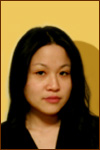 "Classes at the Benevolent Heart Dojo are fun. There is an element of playfulness because you are training with friends but also a sense of formality that comes with the respect the students show each other. It's a nice balance that creates an environment ideal for learning and improving your skills. The instructors go out of their way to help you understand the reasons behind the techniques as well as help you adapt defensive tactics to your personal strengths. Aside from the physical training you are also exposed to the cultural history and the philosophy behind the success of this centuries old martial art. There's something for everyone here and it is so much fun." - Dae Yoo
"Classes at the Benevolent Heart Dojo are fun. There is an element of playfulness because you are training with friends but also a sense of formality that comes with the respect the students show each other. It's a nice balance that creates an environment ideal for learning and improving your skills. The instructors go out of their way to help you understand the reasons behind the techniques as well as help you adapt defensive tactics to your personal strengths. Aside from the physical training you are also exposed to the cultural history and the philosophy behind the success of this centuries old martial art. There's something for everyone here and it is so much fun." - Dae Yoo
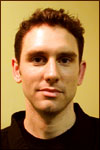 "One satisfying aspect of training with this group is that we all have a lot of respect for each other. No matter what the skill level, we are all treated as equals. Everyone watches out for each other's safety and everyone goes out of their way to ensure that everyone understands each technique on their own terms. Not only have I been learning techniques that could save my or someone else's life, I am learning to expand my awareness of my surroundings, to focus my attention on goals and to trust my reflexes and instincts, both physical and mental. Training is very empowering." - Bo Joseph
"One satisfying aspect of training with this group is that we all have a lot of respect for each other. No matter what the skill level, we are all treated as equals. Everyone watches out for each other's safety and everyone goes out of their way to ensure that everyone understands each technique on their own terms. Not only have I been learning techniques that could save my or someone else's life, I am learning to expand my awareness of my surroundings, to focus my attention on goals and to trust my reflexes and instincts, both physical and mental. Training is very empowering." - Bo Joseph
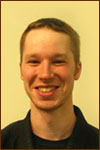 "I firmly believe that training at the Benevolent Heart Dojo has made me a better and more complete person. The experience has improved many aspects of my life ranging from the spiritual to the intensely pragmatic. I very much enjoy this dojo's approach of allowing spiritual growth to emerge from diligent martial training, as I have found it to be very effective at cultivating both the mental and physical aspects of the Bujinkan arts. I find that as a result of my training, I am no longer as determined to find concrete, definitive answers, and am able to accept the existence of multiple, contradicting explanations and general mutability of events in the world. I can see that the principles and practices cultivated at the Benevolent Heart Dojo apply to all aspects of life, and not only do I feel more equipped to protect myself and others in a violent situation, but better able to evade and quell the emergence of violence altogether. The practicality of it all continues to astound and amaze me." - Kenneth Armour
"I firmly believe that training at the Benevolent Heart Dojo has made me a better and more complete person. The experience has improved many aspects of my life ranging from the spiritual to the intensely pragmatic. I very much enjoy this dojo's approach of allowing spiritual growth to emerge from diligent martial training, as I have found it to be very effective at cultivating both the mental and physical aspects of the Bujinkan arts. I find that as a result of my training, I am no longer as determined to find concrete, definitive answers, and am able to accept the existence of multiple, contradicting explanations and general mutability of events in the world. I can see that the principles and practices cultivated at the Benevolent Heart Dojo apply to all aspects of life, and not only do I feel more equipped to protect myself and others in a violent situation, but better able to evade and quell the emergence of violence altogether. The practicality of it all continues to astound and amaze me." - Kenneth Armour
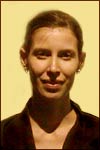 "While training, I am sometimes told to hit with more spirit. This always makes me laugh because I have been training on and off for about a year, and I love it, but I do not have a warrior spirit. I question why I am studying Taijutsu all the time and yet I keep going back to training. Even though I am training with friends, I do try to strike harder and with more precision because I know that at some point, I'll be in a situation where there is no room for error. In class I am challenged to move, think, and focus in a way that I have never had to before. I see how so many ideas are linked and build from sanshin, which I always thought was just a nice warm up. I never thought that it might be safer to get closer to an opponent (as long as your distance and kamae are correct). Rather than hitting, I am amazed at how one, small shift in balance is the difference between staying up while someone twice my size drops to the ground. These moments are the most satisfying. When my friend first introduced me to the Benevolent Heart Dojo it seemed interesting, and each time I go to class I am still interested in seeing where it will lead." - Carolyn Sevos
"While training, I am sometimes told to hit with more spirit. This always makes me laugh because I have been training on and off for about a year, and I love it, but I do not have a warrior spirit. I question why I am studying Taijutsu all the time and yet I keep going back to training. Even though I am training with friends, I do try to strike harder and with more precision because I know that at some point, I'll be in a situation where there is no room for error. In class I am challenged to move, think, and focus in a way that I have never had to before. I see how so many ideas are linked and build from sanshin, which I always thought was just a nice warm up. I never thought that it might be safer to get closer to an opponent (as long as your distance and kamae are correct). Rather than hitting, I am amazed at how one, small shift in balance is the difference between staying up while someone twice my size drops to the ground. These moments are the most satisfying. When my friend first introduced me to the Benevolent Heart Dojo it seemed interesting, and each time I go to class I am still interested in seeing where it will lead." - Carolyn Sevos
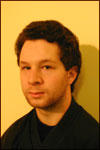 "When asked why I train in martial arts, I usually don't know how I should answer. A perfectly valid answer I think to that query is, "It's fun!". But if I go a bit deeper into that, if I ask myself, "Why is it fun?", things get complicated. I think one reason might be that martial arts is the only thing I have found that combines all aspects of my being - Mind, Body, Spirit whatever and allows me to challenge the cumulative result of these elements while still reminding me of one thing: I am not alone! At one point or another training must involve other people. Yet even though I may be in what looks like some form of duel with this individual, I am still only challenging my own person - trying to get to the next level, whatever that may be. I think our dojo provides a good environment for all students to challenge themselves and improve without having to worry about winning or being better than the next." - David Levy
"When asked why I train in martial arts, I usually don't know how I should answer. A perfectly valid answer I think to that query is, "It's fun!". But if I go a bit deeper into that, if I ask myself, "Why is it fun?", things get complicated. I think one reason might be that martial arts is the only thing I have found that combines all aspects of my being - Mind, Body, Spirit whatever and allows me to challenge the cumulative result of these elements while still reminding me of one thing: I am not alone! At one point or another training must involve other people. Yet even though I may be in what looks like some form of duel with this individual, I am still only challenging my own person - trying to get to the next level, whatever that may be. I think our dojo provides a good environment for all students to challenge themselves and improve without having to worry about winning or being better than the next." - David Levy
 "I have been interested in martial arts for much of my life but did not have the opportunity to engage in formal training until I started college. I truly enjoyed that training and continued with it for many years prior to discovering the Benevolent Heart Dojo. What do I find interesting about martial arts? My interest is multi-faceted: though the physical self-protection aspect is of critical importance, I am also very much interested in the historical, cultural and philosophical components. The Bujinkan tradition speaks to me in all of these areas. In fact, the more I learn about the Bujinkan and these various aspects, the more I want to learn.
"I have been interested in martial arts for much of my life but did not have the opportunity to engage in formal training until I started college. I truly enjoyed that training and continued with it for many years prior to discovering the Benevolent Heart Dojo. What do I find interesting about martial arts? My interest is multi-faceted: though the physical self-protection aspect is of critical importance, I am also very much interested in the historical, cultural and philosophical components. The Bujinkan tradition speaks to me in all of these areas. In fact, the more I learn about the Bujinkan and these various aspects, the more I want to learn.
My path to the Bujinkan started on a purely physical level: I was searching for a comprehensive system of self-protection. For example, such a system would include (but not be limited to) striking, grappling and weapons training without over-emphasizing any one of these areas. Such a system would be effective against a larger adversary and/or multiple adversaries under less than ideal conditions. It should also teach you how to avoid danger completely when that is the most appropriate action. Whereas my previous training focused almost exclusively on one aspect of hand-to-hand combat, the Bujinkan tradition is comprehensive and, like other classical Japanese martial arts, battle tested. I have come to see that in the Bujinkan there are unifying principles that permeate all of its teachings and this, too, is one of its many strengths.
There are many things that come to mind when I think about my training at the Benevolent Heart dojo. From a technical perspective it's fascinating. The quality of instruction is excellent. The feeling is NOT like that of a large commercial school - the feeling is that of a smaller group of dedicated practitioners who enjoy training and sincerely work to help each other learn. I look forward to each and every class because I know that we will be doing something different and interesting everyday.
I feel fortunate to have the opportunity to train as a member of this dojo. My only regret is that I did not find the Benevolent Heart Dojo earlier in my life." - Cameron McNair
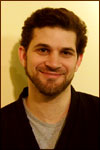 "I originally joined martial arts for self defense and with the single goal of being able to defend myself if someone decided to take a swing at me in the bar. I quickly realized, however, that the principles and awareness that I was gaining permeated many facets of life, and that even though the physical aspect is an end result, I have gained a great deal more. Confidence, respect, and balance both mentally and socially are properties that I have taken from the class in abundance, as well as being able to stop the guy who wanted to pound my face in." - David Kosky
"I originally joined martial arts for self defense and with the single goal of being able to defend myself if someone decided to take a swing at me in the bar. I quickly realized, however, that the principles and awareness that I was gaining permeated many facets of life, and that even though the physical aspect is an end result, I have gained a great deal more. Confidence, respect, and balance both mentally and socially are properties that I have taken from the class in abundance, as well as being able to stop the guy who wanted to pound my face in." - David Kosky
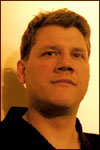 "I've trained within the Bujinkan since 1993 and I still can't come up with a neat and clean answer as to why I train - and I'm not too fussed about it. Training simply makes me feel good inside and (I'm told at least) more balanced on the outside. Best of all, the Bujinkan gives people the latitude to be themselves both inside and outside training. If you want to wear your budo affiliation in everything you do no problem, if you don't want that, again no problem. So there is no specific bujinkan "type" person like you expect to find at a full-contact karate dojo or some Olympic-style tae kwon do dojang. Because of that fact, you meet all kinds of people in an environment where most outside status or cultural roles are muted. For example, when I lived in the UK, one of my consistent training partners and I finally got around to discussing what we did for a living - about three years after we first started. More than the feeling or the techniques, it is the people who make things magic. That's why I keep coming back." - Shidôshi John Gauntt
"I've trained within the Bujinkan since 1993 and I still can't come up with a neat and clean answer as to why I train - and I'm not too fussed about it. Training simply makes me feel good inside and (I'm told at least) more balanced on the outside. Best of all, the Bujinkan gives people the latitude to be themselves both inside and outside training. If you want to wear your budo affiliation in everything you do no problem, if you don't want that, again no problem. So there is no specific bujinkan "type" person like you expect to find at a full-contact karate dojo or some Olympic-style tae kwon do dojang. Because of that fact, you meet all kinds of people in an environment where most outside status or cultural roles are muted. For example, when I lived in the UK, one of my consistent training partners and I finally got around to discussing what we did for a living - about three years after we first started. More than the feeling or the techniques, it is the people who make things magic. That's why I keep coming back." - Shidôshi John Gauntt
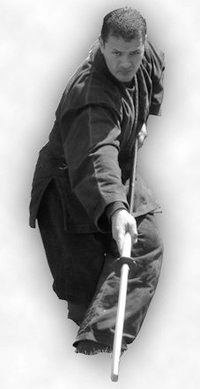
About Dr. Kacem Zoughari, PhD
Dr. Zoughari is a well known Japanese History and Martial Arts researcher and practitioner. Born in Paris, France, he began studying Martial Arts as a teenager and quickly began visiting Japan to further his studies. He has practiced Ninjutsu for over 25 years and is a personal student of Soke Masaaki Hatsumi and Shihan Ishizuka Tetsuji.
Dr. Zoughari began his Ninjutsu training in 1986 in France. In 1989 he made his first trip to Japan where he trained with Ishizuka Sensei. From that point on, he began spending a few months of every year living and training in Japan. Over the ensuing years Kacem became a personal translator for Hatsumi Sensei, acted as a translator for the Quest Video Company, and became a member of the Nihon Budo Gakkai (Japanese Martial Arts research organization).
Between 2001 and 2003 his role as the Lavoisier grant recipient allowed him to study full time in Japan and his research brought him into contact with many of the most well known martial artists in Japan including:
- Kuroda Tetsuzan
- Kono Yoshinori
- Sakai Eiji
- Hirakami Nobuyuki
- Yagyu Nobuharu
Academic Background
Dr. Zoughari received his Masters degree in Japanese History from INALCO. His Masters Thesis was titled: Ninjutsu: Its Form, History, and Essence. On September 8th 2008, Dr. Zoughari received his Ph.D. in Japanese History and Culture with highest honors from INALCO in Paris, France. His thesis was titled: "Tradition du Movement dans les écoles de combat classiques du Japon â partir des documents les plus anciens." (The tradition of movement in the classical combat schools of Japan based on the most ancient documents.) His principle areas of study include:
- Japanese History
- Martial Arts History
- Weapons and techniques of the Edo era police
- Evolution of Martial Art form and movement
Publications
Dr. Zoughari has published more than 25 articles on the topics of Japanese history and martial arts. These articles have been published in French, Japanese, Spanish, English, and many other languages.
A few of the publications in which these articles have been printed in include:
- Arts Martiaux Traditionnels d´Asie
- Hiden, Budo Bujutsu
- Karate-bushido
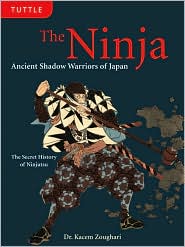
In November of 2003 his first book: Ninpo, Ninjutsu: L'Ombre de la lumière was published by Guy Trédaniel in French. It was subsequently translated into Portuguese under the title A Arte do Ninja - Entre Ilusão e Realidade.
New Book
His newest work, entitled The Ninja: Ancient Shadow Warriors of Japan was recently published by Tuttle. This book is written in English and may be the most thorough review of the history of Ninjutsu ever published outside of Japan.
Lectures & Seminars
Dr. Zoughari has given lectures and seminar tours in over 15 countries and is a highly sought after teacher. The list of universities and organizations he has spoken at include:
- University of Cambridge
- Georgetown University
- American University
- Universityof Montreal
- University of Vienna
- University of Wellington
- SFEJ (French society of Japanese research)
- Osaka University
- Tsukuba University
- Gaikoku-go University
- Kogo University
Kacem continues to travel the world giving lectures and seminars. He is currently living in Japan working as a university professor and researcher. His work in Japan is centered around the continued study of ancient, pre-Edo period ryuha (martial art traditions).
Video "Trailers" of Dr. Kacem Zoughari, PhD in New York
Video "Trailers" of Dr. Kacem Zoughari, PhD outside of New York
Please select(click) a video thumbnail below. David Levy began training in the martial arts at the age of five, with his first experience in Seido karate. In 1998 he began his training in the Bujinkan with Greg Kyle. This is where David was introduced to Joshua Polier who would become his primary instructor and close friend. David also regularly attends seminars and Tai Kai. Some other instructors he has trained with are David Greenberg, Jack Hoban, and Sean Askew. Outside of the martial arts, David is a computer engineer, and a network security enthusiast.
David Levy began training in the martial arts at the age of five, with his first experience in Seido karate. In 1998 he began his training in the Bujinkan with Greg Kyle. This is where David was introduced to Joshua Polier who would become his primary instructor and close friend. David also regularly attends seminars and Tai Kai. Some other instructors he has trained with are David Greenberg, Jack Hoban, and Sean Askew. Outside of the martial arts, David is a computer engineer, and a network security enthusiast.
 Dae Yoo has been training with Joshua Polier and the Benevolent Heart Dojo since 1998. She has also attended seminars with other instructors within the Bujinkan. Her primary motives for studying Taijutsu were self defense but she soon developed a great appreciation for the basic principles and the subtle movements behind the art. In addition to her interest in martial arts, Dae is also studying Chinese calligraphy and brush painting. She often incorporates the feeling of the martial arts into her paintings and uses the brush as an abstract expression of physical movement. She has done all of the original artwork you see on this website including the shadowed images that truly make her work unique.
Dae Yoo has been training with Joshua Polier and the Benevolent Heart Dojo since 1998. She has also attended seminars with other instructors within the Bujinkan. Her primary motives for studying Taijutsu were self defense but she soon developed a great appreciation for the basic principles and the subtle movements behind the art. In addition to her interest in martial arts, Dae is also studying Chinese calligraphy and brush painting. She often incorporates the feeling of the martial arts into her paintings and uses the brush as an abstract expression of physical movement. She has done all of the original artwork you see on this website including the shadowed images that truly make her work unique.
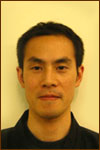 Koji Igarashi began his martial arts training at the age of 12 in Japan.
For many years he enthusiastically trained in Karate and participated in
various Karate competitions. In 2002, Mr Igarashi came to NYC to study Business at
Columbia University. For much of a year he did an extensive search to find
a martial arts school to continue his studies in Budo. In 2003 he found the
school he had been looking for and formally began training in the Bujinkan
with Shidôshi Joshua Noro Polier. Mr Igarashi has been back to Japan several
times for training at the Hombu dojo and with various respected Japanese
instructors. Outside of training, Mr. Igarashi works for a financial
division of a pharmaceutical company.
Koji Igarashi began his martial arts training at the age of 12 in Japan.
For many years he enthusiastically trained in Karate and participated in
various Karate competitions. In 2002, Mr Igarashi came to NYC to study Business at
Columbia University. For much of a year he did an extensive search to find
a martial arts school to continue his studies in Budo. In 2003 he found the
school he had been looking for and formally began training in the Bujinkan
with Shidôshi Joshua Noro Polier. Mr Igarashi has been back to Japan several
times for training at the Hombu dojo and with various respected Japanese
instructors. Outside of training, Mr. Igarashi works for a financial
division of a pharmaceutical company.
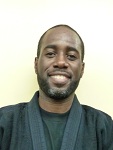 Faruq Lane is a native New Yorker that began his training with the Benevolent Heart Dojo in 2003. Faruq was introduced to Shidôshi Josh Polier by his friend and assistant instructor Cameron McNair. Every since his youth, Faruqís has been intrigued with martial arts. It wasn't until he trained in the Bujinkan that he received his first formal instruction. Faruq attests that training in the dojo has helped him understand the origins of budo; how to persevere when face with life challenges; and strive to maintain a peaceful coexistence with others. Outside of training, Faruq works as a database manager. His favorite activities are listening to jazz music, playing softball, bowling, running and ballroom dancing.
Faruq Lane is a native New Yorker that began his training with the Benevolent Heart Dojo in 2003. Faruq was introduced to Shidôshi Josh Polier by his friend and assistant instructor Cameron McNair. Every since his youth, Faruqís has been intrigued with martial arts. It wasn't until he trained in the Bujinkan that he received his first formal instruction. Faruq attests that training in the dojo has helped him understand the origins of budo; how to persevere when face with life challenges; and strive to maintain a peaceful coexistence with others. Outside of training, Faruq works as a database manager. His favorite activities are listening to jazz music, playing softball, bowling, running and ballroom dancing.
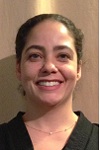 Lyana began her training with Benevolent Heart Dojo in late 2011, two months shy of her 38th birthday. Having had virtually no previous exposure to any martial art - not even in films - she was extremely fortunate to have arrived here through a combined desire for a spiritually-fortifying and physically challenging discipline, as well as for knowledge in self-defense. She remains grateful to the friends who recommended her to BHD as well as to the instructors and fellow members whose dedication to the art have kept her there.
Lyana began her training with Benevolent Heart Dojo in late 2011, two months shy of her 38th birthday. Having had virtually no previous exposure to any martial art - not even in films - she was extremely fortunate to have arrived here through a combined desire for a spiritually-fortifying and physically challenging discipline, as well as for knowledge in self-defense. She remains grateful to the friends who recommended her to BHD as well as to the instructors and fellow members whose dedication to the art have kept her there.
Outside of the Dojo, Lyana serves as a volunteer crisis counselor to survivors of sexual assault and intimate partner violence at two hospitals. She also occasionally performs in community theatre in her neighborhood of Inwood, Manhattan.
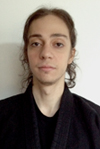 Epy's interest in martial arts started in 1999 when he started practicing Jeet-Kune-Do,
Kali and Pentjak Silat Serak in Italy, where he grew up. He got inspired,
like many other teenagers, by Bruce Lee movies. After some years of traveling and exploring,
he started looking for a martial art that went beyond simply self defense
and explored self and body awareness - how to know and use your body completely.
The search ended in January 2011 when he started practicing with the Benevolent
Heart Dojo as one of the newest members. Outside the dojo, Epy works in postproduction:
design and animation for videos and graphics.
He lives with his girlfriend Diana and enjoys exploring the city and traveling.
Epy's interest in martial arts started in 1999 when he started practicing Jeet-Kune-Do,
Kali and Pentjak Silat Serak in Italy, where he grew up. He got inspired,
like many other teenagers, by Bruce Lee movies. After some years of traveling and exploring,
he started looking for a martial art that went beyond simply self defense
and explored self and body awareness - how to know and use your body completely.
The search ended in January 2011 when he started practicing with the Benevolent
Heart Dojo as one of the newest members. Outside the dojo, Epy works in postproduction:
design and animation for videos and graphics.
He lives with his girlfriend Diana and enjoys exploring the city and traveling.
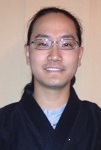 At a young age Y.K.'s father introduced him to basic Kendo. In junior high and high school years he was exposed to Tae Kwon Do, Muay Thai, Karate, Kung Fu, Shaolin Kung Fu, Jeet Kuno Do from friends. His favorite part of high school was spending most of his time after school in the martial arts shelf at Barnes and Noble. Y.K.'s first official class was a self defense class in college. The college course in self defense opened his eyes to explore for an official teacher. The hardest part for Y.K. was pin pointing an art I wanted to dedicate his life to. All that time at Barnes and Noble paid off when he was inspired by Hatsumi Maasakiís books. At that point he started researching for a dojo under the License of Hatsumi Soke. Out of all the Dojos in NYC Y.K. looked through, Y.K. found the BHD to be the most inspiring. Since 2005 Y.K. has been proud to be studying under Sensei Joshua Noro Polier.
At a young age Y.K.'s father introduced him to basic Kendo. In junior high and high school years he was exposed to Tae Kwon Do, Muay Thai, Karate, Kung Fu, Shaolin Kung Fu, Jeet Kuno Do from friends. His favorite part of high school was spending most of his time after school in the martial arts shelf at Barnes and Noble. Y.K.'s first official class was a self defense class in college. The college course in self defense opened his eyes to explore for an official teacher. The hardest part for Y.K. was pin pointing an art I wanted to dedicate his life to. All that time at Barnes and Noble paid off when he was inspired by Hatsumi Maasakiís books. At that point he started researching for a dojo under the License of Hatsumi Soke. Out of all the Dojos in NYC Y.K. looked through, Y.K. found the BHD to be the most inspiring. Since 2005 Y.K. has been proud to be studying under Sensei Joshua Noro Polier.





